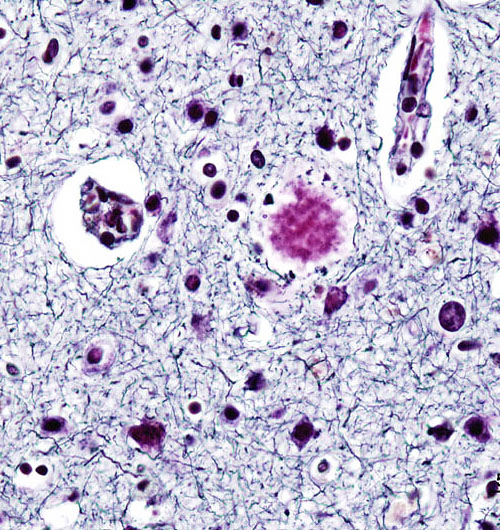Spread of Alzheimer’s proteins shown in healthy people for the first time
Using living elderly people, scientists at Maastricht University (UM) and Harvard Medical School in the US city of Boston have succeeded for the first time in figuring out how Alzheimer’s proteins spread inside the brain. Furthermore, the researchers have actually been able to link this spread to memory problems. The findings of the international research team were recently published in the scientific journal Nature Neuroscience.
Alzheimer’s protein
Alzheimer’s disease, the most common form of dementia, is characterised by the accumulation of two proteins in the brain, namely amyloid and tau. Previous research has shown that these proteins build up for years before the first symptoms (such as memory loss) are noticeable. The Boston-based team, led by UM scientist Heidi Jacobs and Harvard Professor Keith Johnson, researched 256 healthy elderly people between the ages of 64 and 90 over a six-year period. That length of time allowed the researchers to link the spread of proteins in the brain to changes in memory performance.

White matter
To allow them to measure the tau protein in living people the researchers used a radioactive substance known as a PET tracer, which binds itself specifically to this Alzheimer’s protein. The scientists discovered that the tau protein spreads via the connections between brain cells, known as white matter. This process in turn is stimulated by the other Alzheimer’s protein, amyloid beta. In the world of Alzheimer’s research, it has long been known that the accumulation of these proteins in the brain leads to memory problems. Now, the study by Jacobs and her American colleagues has shown not only exactly how the interaction between the amyloid and tau proteins works, but also how it actually leads to memory problems, or even the early stages of dementia.
Early diagnosis
The findings of Jacobs and her team represent an important step in the research into a possible treatment for Alzheimer’s disease. But since the first step towards the disease occurs long before the first symptoms are noticeable, Jacobs wants to expand the research. ‘In the study we’ve just published, we only looked at healthy elderly people aged from 64 to 90’, Flemish-born Jacobs explains. ‘But that’s relatively old when you’re talking about early diagnosis. So we’re now working on a follow-up study, in which we’re going to look at people between 20(!) and 90 years old’. The research in Boston was made possible partly through a contribution from Alzheimer Nederland.
Also read
-
Nienke Verstegen, researcher at De Forensische Zorgspecialisten, has conducted research on aggression within forensic care and its impact on patients and staff. On July 6, 2023, she will receive her PhD from Maastricht University with her dissertation 'Hurt people hurt people. Characteristics and...
-
Patients admitted to hospital due to a severe COVID-19 infection exhibit no evidence of brain damage caused by the disease. This is the conclusion of an extensive study led by Maastricht University.
-
Due to the Western lifestyle with a high fat diet combined with little exercise, more and more people in the Netherlands are overweight or even obese. This causes an increased risk of type II diabetes. What can be done about this besides a healthier lifestyle? The answer comes from an unexpected...


